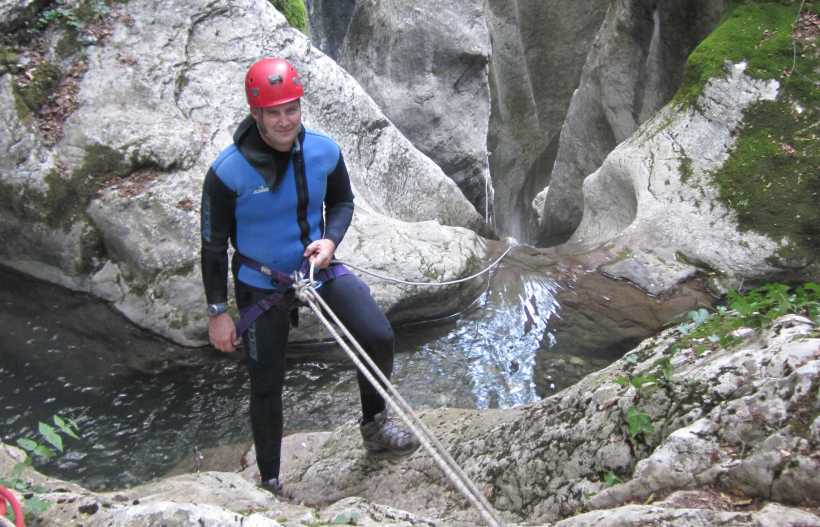PART V. Frequently Asked Questions (FAQ)
Note: I this final section I try to answer some questions that people often ask or should ask me that weren’t covered in the earlier sections.
Steve, I understand how you landed a great job overseas but how can an average guy like me ever hope to achieve my dream?
Well that is a great question and the way you phrased it shows great insight and perception. My advice to anyone wanting to work overseas is to do some real introspection and research before you make the decision. You need to be as sure as you can it is something you really want to do, not just a middle-aged, Walter Mitty fantasy. There is nothing more embarrassing than spending a long time landing that first job overseas and then “popping smoke” your first month there and going home because you don’t like it, or get homesick. If this is really something you want to do follow my advice in section III and be persistent.
I’d like to work overseas but I really just want to do it for a couple of weeks at a time then go home for a while, can I do that?
Join the club, you don’t want to work overseas you want a paid vacation.
Everyone wants to get paid a bunch of money to go overseas for a couple of weeks and teach a class and then go home. Those jobs exist, but they are few and far between, and if you aren’t already doing it there is probably a good reason. If you have some very specialized knowledge or experience, or if you have worked overseas a long time and made a ton of connections (or both), you might land one of these sweet, sweet, jobs. You should, however, plan to pay your dues like everyone else.
Will I have to work in an unpleasant place or can I get a high paid M-F, 8-5 job in London or Paris?
Well, that’s a complicated question there are two parts to my answer:
- Sure, there are good paying, great jobs in London, Paris, Berlin, Geneva, etc. The people working in those jobs are mostly from London, Paris, Berlin, Geneva, etc., or they have degrees from Harvard, Yale, Oxford and a ton of specialized experience in banking, finance, international law, etc. Nice places that aren’t all screwed up have no problem finding people to work there. Also, if they are nice places the people who live there know how to run them and don’t need assistance; hence they probably don’t need your help.
- If you are an Attorney, Cop, or even Judge from “Anytown” USA, and you have no real international experience, but you want to work overseas, you should expect that in order to get hired you will have to go to the places where they need the most people and will hire new, inexperienced people. These places are inevitably the most screwed up places in the world and hence need the most help. Thus in order for you to get a high paying job overseas your first job will probably be somewhere that isn’t a vacation wonderland. Working in unpleasant locations for a year or two is known as “paying your dues.” Many people who do this type of work do it for one contract and leave never to return. Others get used to living in challenging conditions and stay a long time and are fairly happy. Other people decide they like the work but not the location. They pay their dues, make their connections, or just get lucky and find jobs in better locations.
If I have bad debts, beat my wife, don’t pay child support, have a criminal record and dual citizenship will I have trouble getting a job overseas?
Short answer: Yes.
Explanation: They have to do a background check before you can be sent overseas. You will have to get something call a “Public Trust Waiver” to work as a contractor for the USG. If you have problems like those above or there is some reason to question your loyalty to the US you will have trouble getting hired to work overseas.
While I am always surprised at those that somehow slip through the cracks, bad experiences, bad press and litigation have caused companies to look a lot closer at who they are hiring now than they did in the past.
Can I bring my dog/cat/rabbit/pet monkey with me overseas? If I can’t I don’t think I can go.
A surprising number of people have asked me this question. If this is a legitimate question to you, you are probably wasting both of our time. If you would honestly give up a $200,000 a year job because of a cat you’re priorities are probably not what they should be to work overseas and deep down you are not serious about this.
That being said if you lucky enough to get a job where you are responsible for finding your own housing on the local economy there is probably no work related rule saying you can’t bring Fido with you. It is a huge hassle, very expensive to do and you will have to comply with all the laws pertaining to this in every country you go to or through. If Pookie, your spoiled rat dog, is your substitute child and you can’t imagine life without her, knock yourself out. I wouldn’t mention it to your recruiter though. If you just like animals and want to have pet when you are overseas there will be plenty of opportunities to adopt a stray cat or dog in most of the places you will probably work.
Can I bring my spouse & children with me overseas?
I while I would like to say “see above” a better answer is – well it depends, if you get a job in a war zone or recent war zone it is very, very unlikely. If you are lucky enough to land a sweet job in Eastern Europe you probably can bring your family with you. Whether or not you should, or whether it is a good idea and whether it will create all kinds of other problems are all other questions you will have to consider if and when the time comes.
Are you a spy? I heard everyone who works “Overseas” is really a CIA agent.
Ok, stop watching the “Bourne” movies. No, I am not a spy.
What exactly do you do in your job and do you think I am qualified to do something similar?
I can’t tell you in any detail, but I am not a spy, I signed a non-disclosure agreement. I primarily conduct or organize trainings, conferences, etc., and equipment donations. I also advise and mentor local officials as needed and/or appropriate. There is a lot more to it then those two sentences but if you have a pulse you may be qualified. The trick is convincing the person who hires you that you are qualified.
How many hours a week do you work in your job? How many hours a week will I have to work?
See above. Your mileage may vary. Expect your contract to require you to work at least 40 hours per week, probably more.
I was looking at your blog earlier. Will I get to go to all the cool places and see all the neat things you have since you’ve been working overseas?
Short answer: It is hard to say, it is what you make of it. In Iraq and Afghanistan sightseeing opportunites may be limited. But where ever you go there will be things to see and do. When you get R & R you can go anywhere you like.
Do I have to have a security clearance to get a job overseas?
No, but it helps. You don’t need a security clearance to get many overseas jobs. But you will probably have to get a public trust waiver. That is not a security clearance, but to get the waiver you will have to pass a background check. If you pay your bills, meet your obligations and aren’t a criminal you probably can get a public trust waiver without any trouble. Filling out the paperwork is a pain in the ass neck, be prepared.
There are whole subsets of jobs overseas that do require a security clearance. Most contracting companies do not want to go to the trouble and expense of getting a security clearance for potential contractor and would rather hire someone who already possesses the needed clearance if possible. This is where having a clearance of some type can give you a leg up on the competition. If you don’t know whether or not you have a clearance, you probably don’t. If you have never been in the military or never worked for the federal government you probably don’t have a clearance. If you were in the military and went to overseas to Iraq or Afghanistan you may have a “secret” level clearance and not know it. If you have a clearance above secret you will know. There are a lot of overseas jobs that pay well that are based on you having a clearance. If you have one this is a good website to check out: Clearancejobs.com (http://www.clearancejobs.com/ )
Will the local people I work with worship me as the Great White Hunter?
Sorry dude you’re at least 150 years too late for that. But allow me to pontificate: Do not go into this thinking you are going to civilize savages. Everywhere I have been the local people are every bit as civilized as Americans, unfortunately often more so. The local people you work with will be smart and they will be survivors. Many of them will hold advanced degrees, often from the US, often from better schools than you went to. How the locals will react to you will depend on a couple of things: How the US came to be there, and how you act when you are there.
If the US invaded or bombed the country you are in into submission, you should not expect the population there to be all that fond. They may tolerate you, some may even act friendly toward you, but even if they ‘totally had it coming’ people don’t like being bombed and they will resent you being there. Now if the population believes that Americans saved their butts, they will treat you like a rock star. They will have small prepared speeches about their love for you and your country, they may even be sincere. In any event they will gladly accept American aid money, though they will prefer it in the local currency.
You have to do the best you can and try to do your job. Do not expect to change the world, much. Remember that you are not the first contractor to come there and they know you will probably only stay a year maybe two at the most. If they don’t want to do something you want them to do they will humor you and stall until you leave. If you want to know what the local people you work with really think about you buy and read the book “Blink” and watch their expression the split second after you initially talk to them and before they realize you are watching them.
How you act personally will also determine to a large extent how the local people you work with respond to you. If you are the “Ugly American” you’ll get treated like one. If you make an effort to learn the language, customs, culture and care about the people you work with they will treat you with respect, and you may even make a couple of friends.
©2012 by Steven Fenner









